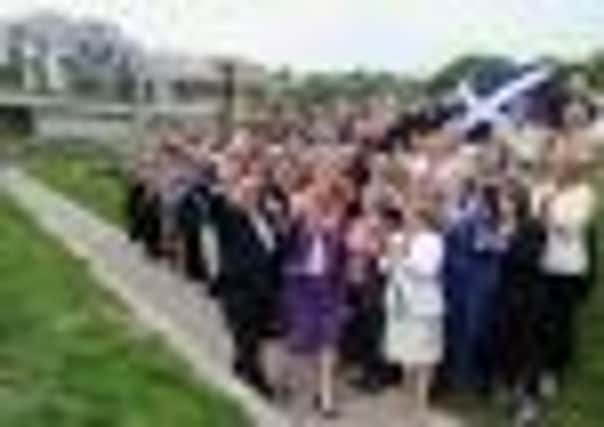Battle lines being drawn by SNP members over key Alex Salmond policies


The first ever comprehensive survey of the SNP’s membership has exposed a series of potentially damaging splits on policies such as defence, education and Salmond’s proposal that the Queen should remain head of state after separation.
The research – led by James Mitchell, professor of politics at Strathclyde University and involving 7,112 paid-up members - uncovered schisms within a party that has made strenuous efforts to appear as one on policy.
Advertisement
Hide AdAdvertisement
Hide AdSince the SNP came to power in 2007, the leadership has exerted an iron grip on discipline – keeping differences of opinion under wraps so that the party can concentrate on its pursuit of independence.
The policy that generated the most consensus was the constitution, with 71.1 per cent agreeing that the SNP’s primary goal was independence and “all else should be secondary”, while 69.6 per cent took the view that when someone criticised Scotland it felt like a “personal insult”.
The research found that 52.7 per cent of SNP members believed membership of Nato was in Scotland’s strategic interests. Only 22.9 per cent signalled that they agreed with the SNP’s controversial policy, which is against Nato membership on the grounds of its pro-nuclear stance.
The SNP leadership’s insistence that Scotland should remove itself from Nato is seen as one of the party’s weakest policies by Salmond’s opponents, who believe it would be highly irresponsible to withdraw from the world’s most successful defence alliance.
In recent times, the SNP has maintained a united front on its Nato position in public. But in private, there are still figures at the top of the party who believe the Nato stance will be a referendum vote loser.
Last night shadow defence secretary Jim Murphy said: “This is pretty embarrassing stuff for the SNP because it shows them completely out of touch with their own members.
“Being in Nato is important not just for our defences, but for Scotland’s manufacturing industries too and all the high-skilled jobs they support.”
A spokesman for the Conservative Party said: “Being a member of Nato gives Scotland a seat at the top table, but Alex Salmond does not see this as important to our security.”
Advertisement
Hide AdAdvertisement
Hide AdThe survey also found that 57 per cent of the sample, which represented more than a third of the total membership of almost 21,000, believed there was no place for the monarchy in a modern democracy.
Salmond’s position is that an independent Scotland would retain the Queen as head of state. Only 19.8 per cent thought there was a place for the monarchy.
On the controversial subject of education by religion, 64.4 per cent thought that separate Catholic schools should be phased out. The SNP has said that it is committed to denominational education.
Mitchell was helped in his research by Dr Lynn Bennie of Aberdeen University and Dr Rob Johns of the University of Essex. The work is to be published in the forthcoming book: The Scottish National Party: Transition To Power. Among the 7,112 members interviewed were senior SNP figures including Cabinet members.
Mitchell said: “The leadership are actually nervous of these issues, I suspect, or if they’re not nervous of them, they feel that these are issues members have strong views on. The Nato issue is a very interesting one.”
Derek Mackay, the SNP’s business convener, said: “Party policy is determined by the votes of ordinary members at our annual and spring conferences and at National Council meetings.
“People from all walks of life and social backgrounds are members of the SNP so it is hardly surprising there is a wide range of political thought amongst party membership. “However, the SNP is solidly united as we enter most exciting period of Scotland’s history.”